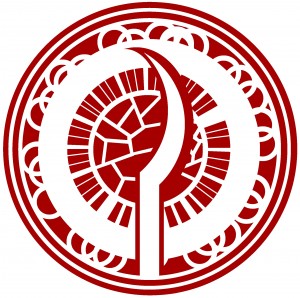Toutes les fois que je donne une place vacante, je fais cent mècontents et un ingrat.
Every time that I fill a high office, I make one hundred men discontented and one ungrateful.
Louis XIV
Anarchism is many things, and it is faulted in many ways by its challengers. Opponents see it as insufficient, incapable of constructing alternative institutions to those institutions of authority it seeks to erode and destroy. Such opponents are correct.

The thing anarchism’s opponents don’t realize seems to be that anarchists don’t actually care that they have no alternative institutions to the state. They are quite willing to insult, injure and eliminate the state and its institutions because they find these unjust, and creating alternatives is not the concern of them or any other iconoclasts.
In truth, creating alternatives has never been the concern of any iconoclasts or revolutionaries, from Oliver Cromwell’s club to George Washington’s club to the Jacobin club and the Bolshevik club. And, actually, no-one needs to have an alternative to justify their desire to eliminate what they see as unjust and illegitimate figures and institutions. We need not replace the leviathan with another, at all. It simply isn’t the concern of someone who attacks injustice.
The question, “what’s your solution?” or that favorite slogan of all reactionaries, “there is no alternative” (TINA), is invalid. It is a fallacy to say someone else lacks a comprehensive enough program of change, simply because their program isn’t as complex or multifaceted as the status quo. This reactionary tactic of quoting facts on the ground has been used to attack all progress before it occurs. This thinking would say “you’re in jail, therefore you’re a criminal”, or “we can’t free the slaves, because they’ll get angry and want revenge” (an argument Thomas Jefferson actually used even though he accepted black people as his equals). Appealing to consequences and appealing to the status quo doesn’t do anything to vindicate or justify what is unjust, in any way.
The fallacy of simply appealing to the status quo is even used to refute the two-state solution in Palestine as well: you can’t just create a Palestinian state, because Palestine doesn’t have the necessary institutions and control of territory to be a state. In truth, the reason Palestine lacks these state features is that it isn’t permitted them by the occupying power, Israel, and the reason the occupier doesn’t allow them is because occupier doesn’t want to recognize Palestinian statehood. In reality, as soon as the occupier ends the occupation, recognizes Palestinian statehood, and quits using the fallacy of appealing to the facts it created on the ground via military occupation, the sooner Palestinian statehood will be a viable resolution to the conflict.
We shouldn’t be led around like mules by the people who have a stick, into thinking “there is no alternative”. This is the case in any debate. Instead, we should take that stick and start beating our would-be masters with it until they start considering the alternatives, for their own sake.
However, even though one doesn’t need to be armed with any alternatives to actually justify criticizing the behavior and actions of states and superpowers, there are in fact abundant alternatives. People have put a lot of time into thinking of them. Consider, for example, Jacque Fresco’s famous Venus Project. That is actually a comprehensive political plan for overcoming scarcity, poverty and war on a planetary scale, and many commentators see it as viable. Sure, Jacque Fresco’s futurist models and plans aren’t as complex or multifaceted as the status quo, and they don’t have a solution to every problem you can think of, but his work opens a significant credible avenue for change and a methodology for confronting global problems that would entail many solutions in the long term. Ultimately, the Venus Project is a sound global political campaign and actually entails an alternative to the modern state. It predicts a future with no need for borders, national armies, security forces, et cetera: in many ways an anarchist utopia.
I, and Jacque Fresco, depart from the anarchist way of thinking in that neither of us sees it possible or desirable to really banish authority or to govern an authority-free society. We can certainly banish authoritarianism, but authoritativeness will always exist. For an example, look at anarchism itself. Anarchism itself professes to have authority, and it is influenced more heavily by some rather than others. Those people are, by definition, intellectual authorities. If anarchism as a movement can’t do away with its own authoritativeness without losing relevance, how can it really create a society where authority doesn’t exist?
What can be created is an anti-authoritarian future, a step above the kind of flawed and limited liberal democracies we presently have in Europe. Such a society wouldn’t be authoritarian, but it would be very authoritative, more so in fact that any political system before it. In any community that values merit, there is de facto authority. People naturally look to people, intellectual contributions and groups with more merit or more experience than themselves in search of leadership, and there is nothing authoritarian or politically harmful in doing so. In fact, it is the people’s will that the people should have authority over their own future, and they best do so by investing in specific figures whom they believe will represent their interests. These figures may be public intellectuals, like Jacque Fresco himself, or an elected representative. Either way, they are organic authorities. By not allowing the public to invest their own inherent public authority in a figure, it would be the people that are disempowered and made unable to express their will; not the leader figure. The moment any tongue wags, there is de facto authority. Even in online gaming clans, where everyone is actually equal, there is authority in the people who perform best and rank higher. Therefore, the only way we could really banish authority from life is by removing all tongues. Such an atrocity would not just be authoritarian, but tyranny.
No one can deny the authority of the people, and the people will always invest that authority in a public figure, who will be as a legitimate voice for their interests. Such will be the case for as long as humans retain their human forms, for it is a constant observation that people are inherently of varying statures, eloquence, popularity and influence.
I explain the extent of my antistatism, which is not quite anarchism or any ideology in particular, in a new article exclusive to ClubOfINFO. I wrote the article as a starting point for a discussion or exchange of ideas between me and J. M. Porup, who mentioned the matter of him not being an antistatist when I added him to the Mont Order.


